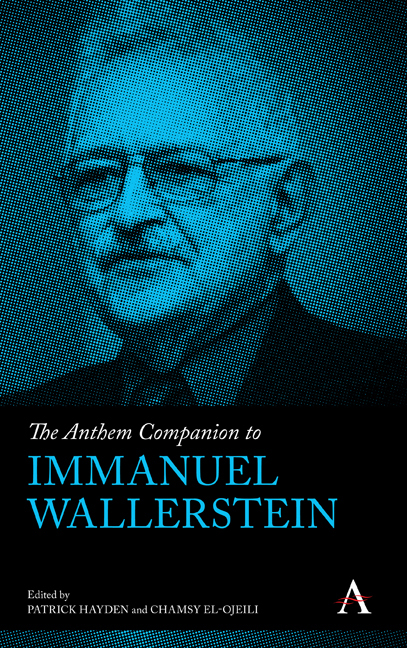Book contents
- Frontmatter
- Contents
- Notes on Contributors
- Acknowledgments
- Chapter 1 “There Is No Such Thing as Sociology”: Wallerstein as Sociologist
- Chapter 2 From Africa to the World: The Sources of Wallerstein’s The Modern World-System
- Chapter 3 Immanuel Wallerstein, World-Systems Analysis and the Structures of Knowledge
- Chapter 4 Wallerstein as International Political Sociologist: On Power, Hegemony and the Interstate System
- Chapter 5 The Agonies of Liberalism: Wallerstein on the Rise and Fall of Liberal Ideology
- Chapter 6 Global Inequalities Avant la Lettre: Theoretical Filiations and Radical Critique
- Chapter 7 Reckoning with Gender in the World-System: Insights from and Challenges to Wallerstein
- Chapter 8 The Past and Future of Antisystemic Movements: Possibilities and Limits of Social Change in Wallerstein’s World-Systems Analysis
- Chapter 9 The Global Environment and Climate Change inthe Modern World-System
- Chapter 10 Pervasive Pandemics: Understanding Global Healthand Disease from a World-Systems Perspective
- Index
Chapter 8 - The Past and Future of Antisystemic Movements: Possibilities and Limits of Social Change in Wallerstein’s World-Systems Analysis
Published online by Cambridge University Press: 29 February 2024
- Frontmatter
- Contents
- Notes on Contributors
- Acknowledgments
- Chapter 1 “There Is No Such Thing as Sociology”: Wallerstein as Sociologist
- Chapter 2 From Africa to the World: The Sources of Wallerstein’s The Modern World-System
- Chapter 3 Immanuel Wallerstein, World-Systems Analysis and the Structures of Knowledge
- Chapter 4 Wallerstein as International Political Sociologist: On Power, Hegemony and the Interstate System
- Chapter 5 The Agonies of Liberalism: Wallerstein on the Rise and Fall of Liberal Ideology
- Chapter 6 Global Inequalities Avant la Lettre: Theoretical Filiations and Radical Critique
- Chapter 7 Reckoning with Gender in the World-System: Insights from and Challenges to Wallerstein
- Chapter 8 The Past and Future of Antisystemic Movements: Possibilities and Limits of Social Change in Wallerstein’s World-Systems Analysis
- Chapter 9 The Global Environment and Climate Change inthe Modern World-System
- Chapter 10 Pervasive Pandemics: Understanding Global Healthand Disease from a World-Systems Perspective
- Index
Summary
This chapter will consider the character and role of antisystemic movements in Immanuel Wallerstein's theorization of the modern world-system. It will trace Wallerstein's engagements with this question particularly since the appearance of the “movement of movements” against neoliberal globalization in the late 1990s, when he argued that the struggle for a better social world could be framed by the alternative between the “spirit of Davos” and the “spirit of Porto Alegre.” The chapter will consider Wallerstein's twenty-first century arguments relative to his classical elaboration of the subject and consider their contributions and limitations for this era of antisystemic social mobilization.
Throughout his long life, Immanuel Wallerstein was attentive to what he called “antisystemic movements” as central to diagnosing prospects for progressive transformation in and beyond the current world-system. World-systems analysis (WSA), as it has been constructed by Wallerstein as its leading architect, is normative, strategic and politically invested in its historical analysis and its prognoses for the future of antisystemic struggle. Antisystemic movements are thus central to what Wallerstein termed utopistics, or “the serious assessment of historical alternatives” to the current world-system (Wallerstein 1998, 1).
In this chapter, I review the character and role of antisystemic movements in Wallerstein's theorization of the modern world-system as they appear in his classic treatment (1990; as well as 2004, 2014). Through a comparative dialogue with the “contentious politics” tradition which has come to dominate the field, I consider the contribution of WSA to analyzing social movements, while also observing that Wallerstein replicates some problematic patterns and assumptions common to modern social theory, notably its Eurocentrism. I then turn to Wallerstein's later writings in the context of the Global Justice movements, especially his engagements with the World Social Forum (WSF) process, where he was confronted with a recomposition of the global left (Santos 2006), including “indigenista” movements arising from the exteriority of modernity or “colonial difference” (Mignolo 2002; see also Escobar 2007).
The WSF is the historical reference point for Wallerstein's exhortation of the “spirit of Porto Alegre” over against the “spirit of Davos” in contemporary struggles over a successor world-system.
- Type
- Chapter
- Information
- The Anthem Companion to Immanuel Wallerstein , pp. 145 - 162Publisher: Anthem PressPrint publication year: 2023

